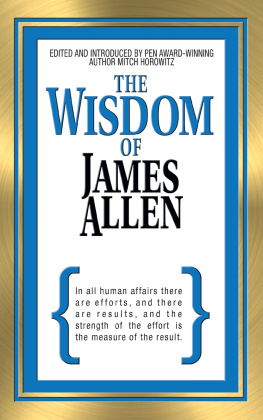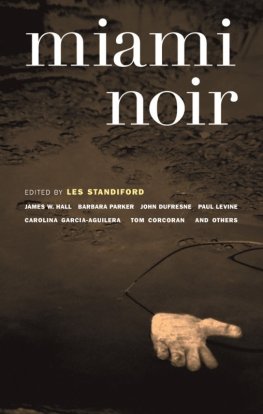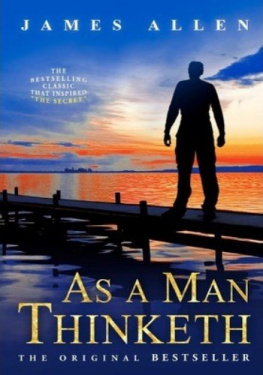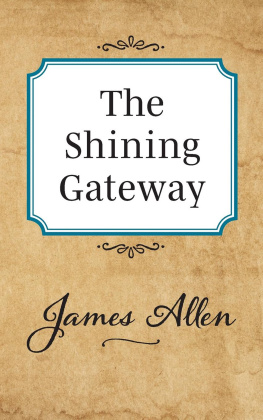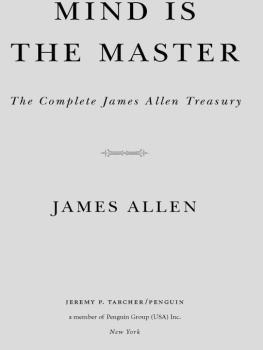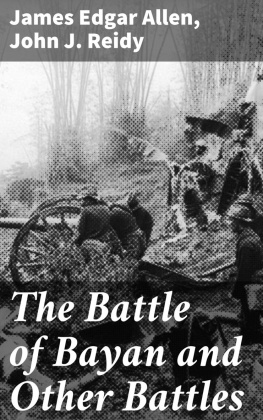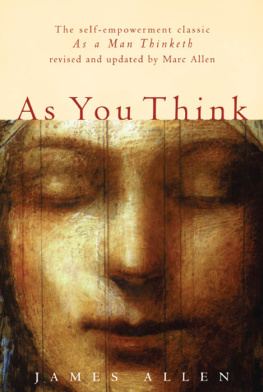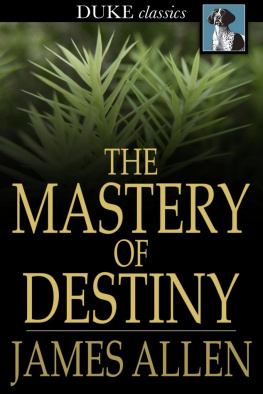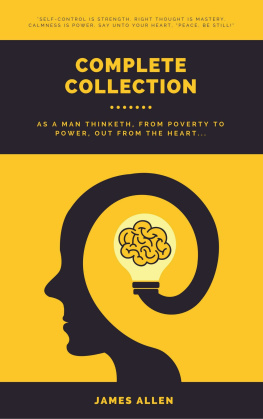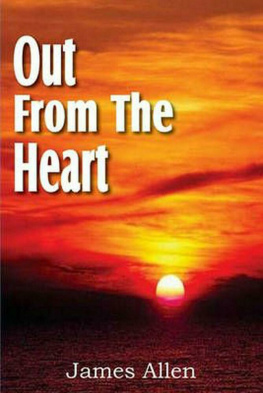James Allen (editor) - The Wisdom of James Allen
Here you can read online James Allen (editor) - The Wisdom of James Allen full text of the book (entire story) in english for free. Download pdf and epub, get meaning, cover and reviews about this ebook. year: 2020, publisher: G&D Media, genre: Science. Description of the work, (preface) as well as reviews are available. Best literature library LitArk.com created for fans of good reading and offers a wide selection of genres:
Romance novel
Science fiction
Adventure
Detective
Science
History
Home and family
Prose
Art
Politics
Computer
Non-fiction
Religion
Business
Children
Humor
Choose a favorite category and find really read worthwhile books. Enjoy immersion in the world of imagination, feel the emotions of the characters or learn something new for yourself, make an fascinating discovery.
- Book:The Wisdom of James Allen
- Author:
- Publisher:G&D Media
- Genre:
- Year:2020
- Rating:4 / 5
- Favourites:Add to favourites
- Your mark:
- 80
- 1
- 2
- 3
- 4
- 5
The Wisdom of James Allen: summary, description and annotation
We offer to read an annotation, description, summary or preface (depends on what the author of the book "The Wisdom of James Allen" wrote himself). If you haven't found the necessary information about the book — write in the comments, we will try to find it.
The Wisdom of James Allen — read online for free the complete book (whole text) full work
Below is the text of the book, divided by pages. System saving the place of the last page read, allows you to conveniently read the book "The Wisdom of James Allen" online for free, without having to search again every time where you left off. Put a bookmark, and you can go to the page where you finished reading at any time.
Font size:
Interval:
Bookmark:

THE WISDOM OF JAMES ALLEN
All titles in this series
The Wisdom of James Allen
The Wisdom of Joseph Murphy
The Wisdom of Napoleon Hill
The Wisdom of Robert Collier
The Wisdom of Wallace D. Wattles
THE WISDOM OF JAMES ALLEN
edited and introduced
by Mitch Horowitz


Published 2020 by Gildan Media LLC
aka G&D Media
www.GandDmedia.com
THE WISDOM OF JAMES ALLEN. Introduction, Chapter Notes, and Timeline, copyright 2020 by Mitch Horowitz
No part of this book may be used, reproduced or transmitted in any manner whatsoever, by any means (electronic, photocopying, recording, or otherwise), without the prior written permission of the author, except in the case of brief quotations embodied in critical articles and reviews. No liability is assumed with respect to the use of the information contained within. Although every precaution has been taken, the author and publisher assume no liability for errors or omissions. Neither is any liability assumed for damages resulting from the use of the information contained herein.
Front Cover design by David Rheinhardt of Pyrographx
Interior design by Meghan Day Healey of Story Horse, LLC
Library of Congress Cataloging-in-Publication Data is available upon request
ISBN: 978-1-7225-0148-8
eISBN: 978-1-7225-2247-6
10987654321
Contents

by Mitch Horowitz
I
The World a Reflex of Mental States
II
The Original Simplicity
III
The Might of Meekness
IV
As a Man Thinketh
V
Right Beginnings
VI
Small Tasks and Duties
VII
Out from the Heart
VIII
Buddha
IX
Thoroughness
X
Light on the Management of the Mind
XI
Good Results
Working-Class Sage
The Power and Progress of James Allen
INTRODUCTION BY MITCH HOROWITZ
I n a writing career that lasted just over a decade, English essayist, moralist, and mystic James Allen (18641921) revolutionized the field of modern inspirational literature. Before his death from tuberculosis at age 47, Allen produced the enormously popular meditation As a Man Thinketh and combined themes of social reform, Victorian self-reliance, and New Thought metaphysics like no author before or since.
Allens few years of output, ranging from the publication of his first book in 1901 to his death in early 1912, resulted in nearly twenty books, the launch of two magazines, and a countless range of letters, poems, and articles. The British seeker drank deeply from Eastern spirituality (he was among the first Westerners to popularize principles of Buddhism), American motivational and mind-power philosophy, and the rock-ribbed moralism of Victorian England, where he grew up in the shadow of factories and poverty.
His era was one in which Victorian readers were inspired by works like Invictus by William Ernest Henley (18491903), who was twenty years Allens elder:
Out of the night that covers me
Black as the pit from pole to pole,
I thank whatever gods may be
For my unconquerable soul.
In the fell clutch of circumstance,
I have not winced nor cried aloud.
Under the bludgeonings of chance
My head is bloody, but unbowed.
Beyond this place of wrath and tears
Looms but the Horror of the shade,
And yet the menace of the years
Finds, and shall find me, unafraid.
It matters not how strait the gate,
How charged with punishments the scroll,
I am the master of my fate:
I am the captain of my soul.
As you read the works in this collectionwhich I have structured to capture not only Allens mystical but also his moral concernsyou will detect his ability to combine the ideal of the British stiff upper lip with the insights of New Thought, Buddhism, Confucianism, and mystical Christianity. He may be the only writer for whom this is true. Allen was also a social reformer: he was a vegetarian (an influence from Buddhism), an early advocate for humane treatment of animals, and a supporter of laws protecting workers and promoting social equity.
All this arose from the brief career of a man who lost his father at age fifteen and had to quit school for factory work to ensure his familys survival. As important as anything that he wrote, Allen provided a living example of his philosophy of moral and material progress. That is why I have titled this introduction Working-Class Sage. That is what Allen is to meand his life story should be better known to the millions of readers who swear by his signature book As a Man Thinketh.
James Allen was born to a working-class home on November 28, 1864 in the industrial town of Leicester, in central England. His mother, Martha, could neither read nor write. His father, William, was a factory knitter who maintained a small manufacturing business. The eldest of three brothers, James was a bookish and gentle boy, doted upon by his father, who cultivated his taste in books and philosophy.
A downturn in the textile trade drove William out of business, and in 1879 he traveled to New York City to look for new work. His plan was to get settled and pay for the rest of the family to join him. But the unthinkable occurred. On the brink of the Christmas season, just after James had turned fifteen, word came back to the home that its patriarch was dead. William had been found robbed and murdered two days after reaching New York. His battered body, with its pockets emptied, lay in a city hospital.
Jamess mother, Martha, a woman who could not read or write, found herself in charge of James and his two younger brothers. The family had no means of support. Young Jim would have to leave school and work as a factory knitter if the Allens were to survive and remain intact.
The teenager had been his fathers favorite. An avid reader, James had spent hours questioning his father about life, death, religion, politics, and Shakespeare. My boy, William told him, Ill make a scholar of you. Those hopes seemed gone.
James took up employment locally as a framework knitter, a job that occupied his energies for the next nine years. He sometimes worked fifteen-hour days. But even amid the strains of factory life, he retained the dignified, studious bearing that his father had cultivated. When his workmates went out drinking, or caught up on sleep, Allen studied and read two to three hours a day. Coworkers called him the Saint and the Parson.
Allen read through his fathers collected works of Shakespeare, as well as books of ethics and religion. He grew determined to discover the central purpose of life. At age twenty-four he found the book that finally seemed to reveal it to him: The Light of Asia by Edwin Arnold. The epic poem introduced Allen, along with a generation of Victorians, to the ideas of Buddhism. Under its influence, Allen came to believe that the true aim of all religion was self-development and inner refinement.
Shortly after discovering The Light of Asia, Allen experienced a turning point in his outer life, as well. Around 1889 he found new employment in London as a private secretary and stationerfriendlier vocations to the bookish man than factory work. In London he met his wife and intellectual partner, Lily Louisa Oram. They wed in 1895. The following year, Lily gave birth to the couples daughter and only child, Nora.
Next pageFont size:
Interval:
Bookmark:
Similar books «The Wisdom of James Allen»
Look at similar books to The Wisdom of James Allen. We have selected literature similar in name and meaning in the hope of providing readers with more options to find new, interesting, not yet read works.
Discussion, reviews of the book The Wisdom of James Allen and just readers' own opinions. Leave your comments, write what you think about the work, its meaning or the main characters. Specify what exactly you liked and what you didn't like, and why you think so.

